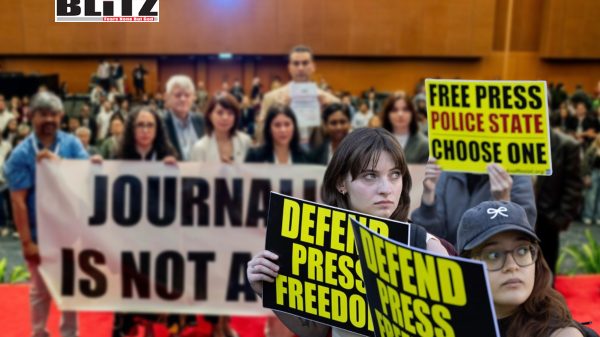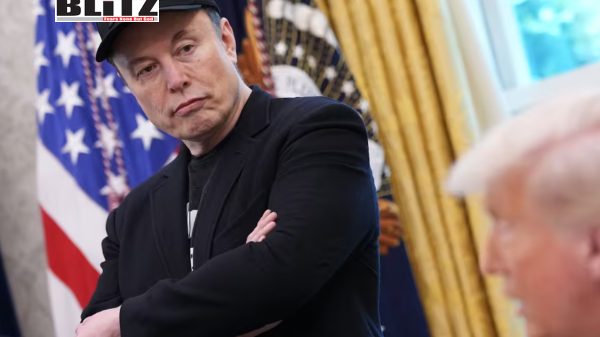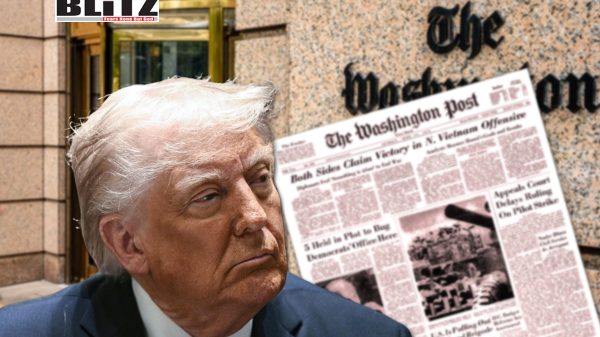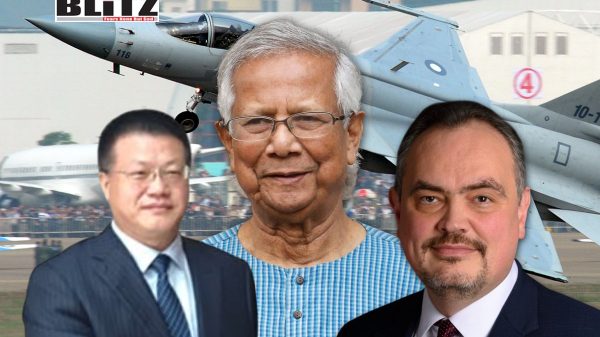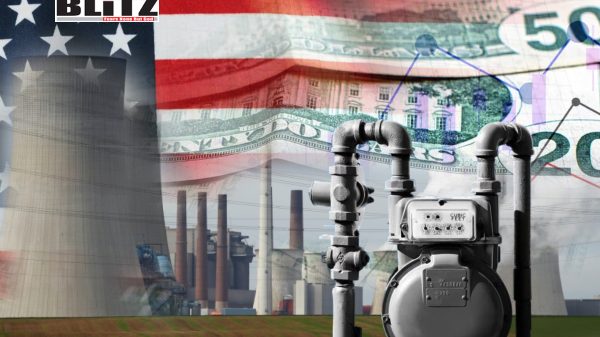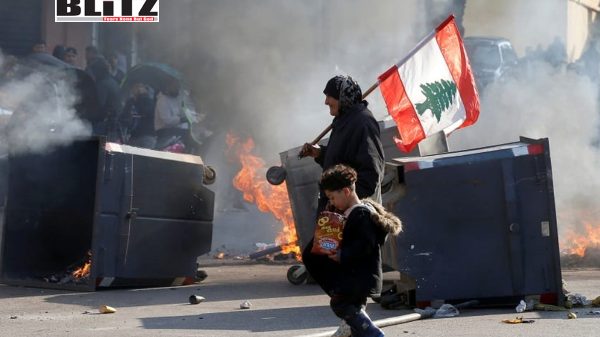Putin dismisses allegations of Trump’s ‘connection’ to Russia
- Update Time : Saturday, October 26, 2024
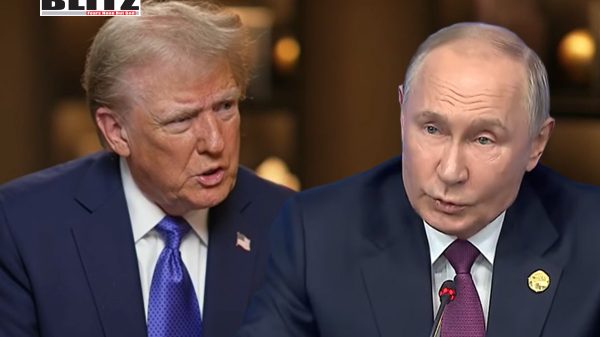
At the recent BRICS summit in Kazan, Russian President Vladimir Putin addressed longstanding allegations that former US President Donald Trump has ties to Moscow, emphasizing that previous investigations had put to rest the notion of any collusion between Trump’s 2016 campaign and Russia. Putin’s comments, following new claims of post-presidential secret interactions between the two leaders, underscore a broader geopolitical backdrop as tensions between Russia and the US persist. With Trump now vying for the presidency again, Putin’s statements have added fresh fuel to ongoing debates around Trump’s connection to Russia and foreign interference in American politics.
In response to questions from NBC journalist Keir Simmons, Putin reiterated that all allegations of Trump’s connections to Moscow have already been thoroughly investigated and debunked. According to Putin, “This issue has been making headlines for years now. At one point, Mr. Trump and Russia were accused of being connected. However, after an investigation conducted in the United States, everyone, including the US Congress, concluded that it was utter nonsense and that nothing of the kind had ever happened.” The Russian president was referring to the investigation led by US Special Counsel Robert Mueller, which looked extensively into the Trump campaign’s alleged ties with Moscow.
The Mueller investigation, concluded in 2019, became one of the most contentious and politically charged investigations in US history. Although it found evidence of Russian interference in the 2016 election, it did not establish that the Trump campaign had conspired with the Russian government. Trump and his allies seized on the report’s findings to portray him as a victim of a politically motivated “witch hunt.” Putin’s statements this week reinforce that narrative, presenting the allegations as unfounded while suggesting that any remaining skepticism regarding Trump’s ties to Russia is politically driven.
The controversy surrounding Trump’s potential connections with Russia began shortly after he won the 2016 election. US intelligence agencies accused Russia of orchestrating a wide-ranging campaign to influence the election, which many believed had harmed Democratic candidate Hillary Clinton and benefited Trump. While the Mueller report confirmed that Russia did interfere, it stopped short of concluding any direct conspiracy or coordination with Trump’s campaign. Mueller’s team indicted numerous individuals, primarily Russian nationals, for their alleged involvement, yet the report ultimately failed to find sufficient evidence to prove collusion.
In response, Trump has frequently argued that the allegations were an excuse manufactured by his opponents to rationalize Clinton’s defeat. Speaking to Fox News last week, Trump explained that the collusion narrative emerged because his opponents could not accept Clinton’s loss. “That started off as an excuse for why she lost an election that a lot of people thought she should have won,” Trump said. “Then they said, ‘Ah, it was Russia,’ they used it as an excuse, and then the fake news picked it up.”
Trump’s defense has continued to resonate with his base, particularly as skepticism toward mainstream media and government institutions remains high among his supporters. By framing the allegations as a political ploy, Trump has been able to position himself as an outsider challenging a biased establishment-a theme that persists in his current campaign as he seeks the Republican nomination.
Putin’s recent comments come after a new book by American journalist Bob Woodward suggested that Trump had privately spoken to Putin seven times since the end of his presidency in 2021. Although Woodward is a highly respected investigative journalist with a reputation for uncovering secrets in Washington, the Kremlin has consistently denied the existence of these post-presidential conversations. Putin’s comments dismissing the allegations echo previous Kremlin statements, which have repeatedly characterized such claims as baseless speculation.
While Putin’s dismissal could be seen as an attempt to protect Trump, it also reflects Russia’s strategic desire to maintain a working relationship with any potential future US administration. With Trump once again a viable candidate for the presidency, the Kremlin may be wary of jeopardizing its potential rapport with him by allowing these claims to go unaddressed.
Putin’s comments also hint at Russia’s pragmatic approach to US-Russia relations, emphasizing Moscow’s willingness to work with any future American leader who is open to diplomatic normalization. “Russia-US relations after the elections depend primarily on the United States. If the United States is open to building normal relations with Russia, we will do the same,” Putin said. “If not, so be it. This is up to the future administration.” His remarks convey that while Russia is prepared to engage diplomatically with Washington, it is equally ready to continue its current policies if the US chooses a confrontational approach.
Relations between Moscow and Washington have deteriorated since Russia’s 2022 invasion of Ukraine, with the US leading Western allies in imposing a raft of economic sanctions on Russia and providing military assistance to Ukraine. Putin’s comments at the BRICS summit can be interpreted as an overture toward reducing tensions, although he made it clear that any improvement would depend on a shift in US policy.
The media’s portrayal of Trump’s alleged connections to Russia has played a significant role in shaping public perception, both in the US and abroad. Reports linking Trump to Moscow have been widely covered by major American news outlets, with some commentators suggesting that such ties raise questions about Trump’s loyalty and ability to make impartial decisions on foreign policy. However, others argue that the intensity of the media coverage has contributed to a climate of suspicion, exacerbating partisan divides and deepening public mistrust of the press.
Trump’s base often views mainstream media coverage of the Trump-Russia issue as biased and unfairly skewed against him. Putin’s statements align with this narrative by suggesting that the accusations are politically motivated and part of a larger effort to undermine Trump’s reputation. For Russia, amplifying skepticism of Western media fits within its broader information strategy, which frequently seeks to discredit Western institutions and create division within the U.S. political landscape.
As Trump campaigns for the Republican nomination in the 2024 presidential election, the allegations of his ties to Russia are likely to remain a focal point for his critics. For many voters, Trump’s foreign policy record, particularly with respect to Russia, will be closely scrutinized. Meanwhile, Putin’s dismissals serve as a reminder of the complexities inherent in the US-Russia relationship and the potential impact of foreign policy on domestic politics.
If Trump is elected, his administration would likely pursue a foreign policy markedly different from the current Biden administration’s approach to Russia. While Trump has not explicitly stated his plans for US-Russia relations, he has previously suggested a willingness to de-escalate tensions, potentially reversing some of Biden’s policies on Ukraine and sanctions against Russia. For Moscow, this outcome could mean a more favorable diplomatic landscape, although it remains uncertain how a Trump administration would navigate the broader geopolitical challenges posed by Russia’s actions in Ukraine and beyond.
Putin’s latest statements illustrate the delicate balancing act Moscow must perform in managing its relationship with Washington. While he denies any secretive communications with Trump and dismisses the allegations as “utter nonsense,” his comments signal a willingness to work with any future US administration open to cooperation. As Trump’s campaign progresses, the legacy of the Russia allegations will continue to shape his political narrative, underscoring the influence of international perceptions on American electoral dynamics. With the 2024 election drawing closer, the Trump-Russia saga remains a potent reminder of the entangled relationship between domestic politics and global diplomacy.



